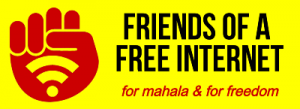People’s Media Consortium and Yetu Infotech Collective, along with representatives of over 80 civil society organisations, today gathered to launch the Friends of Free Internet campaign.
The campaigners are advocating for a communication commons that is “free as in Mahala and free as in freedom” in South Africa.
The campaign aims to provide solutions for underserved communities to have access to the internet and to also decrease the digital divide in the country.
Since 2016, South Africans have taken to social media to express their frustrations with local mobile operators, resulting in the #DataMustFall movement often trending on various sites, receiving widespread media attention and attracting Parliament’s attention.
Addressing Youth Day celebrations last month, president Cyril Ramaphosa also lamented the high costs of data in SA.
“By simply lowering data costs, young people are more readily able to access information, and seek learning and earning opportunities. This isn’t just about cheaper or faster internet or having access to social media,” Ramaphosa said.
According to the campaigners, internet access is a fundamental right that enables other rights and serves as an economic multiplier, creating decent jobs and delivering services to address SA’s deepening social and economic crisis.
Yet, they say, over 40% of people still have no internet access and only 8.3% of households have access to high-speed broadband – the vast majority remain a hostage of MTN, Vodacom, Telkom and Cell C.
The Friends of Free Internet believes the internet must be accessible to everyone free of charge.
Yetu Infotech Collective member Mark Weinberg explains: “Mahala is the popular South African phrase meaning no cost to the end-user. The actual costs of providing internet services must be paid in the same way end-users enjoy roads and libraries for free.
“The internet is a public good so we should not pay for the massive profits the corporations are extracting from the public.”
In a telephone interview, Weinberg told ITWeb the private sector should be taxed more in order to subsidise data, which will be a step in the right direction to free data.
He also pointed out mobile companies should provide a minimum amount of data that is free; for example, 20GB free every month to use.
“This will definitely not be an overnight success, but taking steps in the right direction is important, as we are slowly moving into the digital space.”
The campaigners note the licence conditions of the 2022 spectrum auction commit the mobile corporations to cover over 97% of SA, connect public buildings (schools, clinics, etc) to broadband and offer free access to non-profit websites.
They add the communications minister has also promised 10GB/month free data to every household.
“Every South African household – despite being rich or poor, employed or unemployed – will have access to 10 gigabytes per month,” said communications minister Khumbudzo Ntshavheni in February, during the State of the Nation Address debate.
However, the Friends of Free Internet alleges mobile operators have a long history of putting profit before people and opting to pay fines rather than extend coverage to the marginalised majority.
Government has also consistently missed its connectivity targets, it adds.
Erna Curry of the People’s Media Consortium comments: “These commitments could be a good start towards free internet, but we’ve heard promises of a better life before. We know after 27 hard years of ANC rule that little will change without active movements making demands and holding the state accountable.”



